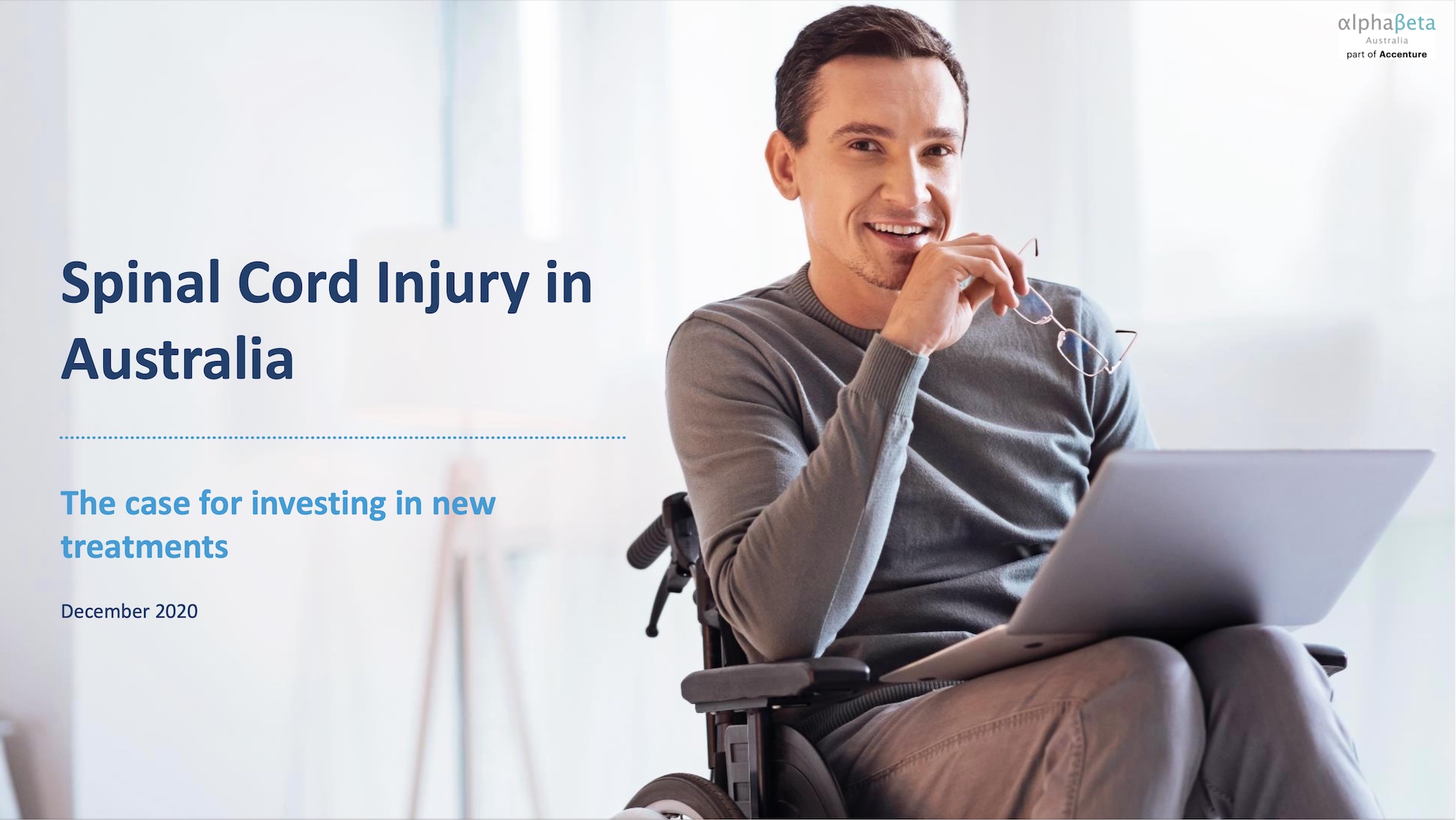Spinal cord injuries cost Australian economy $74.5b but small investments could reverse the emotional and financial impact.
Sydney, 15 December 2020: A new landmark report released today by AlphaBeta, commissioned by SpinalCure Australia and supported by a grant from the icare Foundation (Insurance and Care NSW), shows that Spinal Cord Injuries (SCI) cost the Australian economy $3.7 billion per annum and the total lifetime cost of SCI in 2020 is estimated at $75.4 billion. Further, if a treatment could improve muscle function in just 10% of people with SCI, it can offer $3.6bn–$10.3bn in cost savings.
The impact of an SCI on a person is devastating—one third of Australians with an SCI have a severe injury, resulting in no movement in the affected parts of their body. This limits mobility, affecting independence, and impairs bodily functions such as breathing, digestion and sexual function, all contributing to high lifetime costs to the government, individuals and their families, and losses in broader economic productivity.
Current treatment options for SCIs are heavily reliant on rehabilitation and the use of external supports, limiting the extent of recovery.
However, dedicated researchers have made exciting breakthroughs in treatment options in the last decade that could make restoration of the spinal cord and recovery from SCIs possible.
Key findings include:
- New spinal cord stimulation treatment requiring $20m in investment, can potentially achieve a cost saving of $1.3bn, resulting in a benefit cost ratio of 1.96.
- Clinical trials using neuroprotective agents, stem cells or neurostimulation have been successful in significantly preventing or reversing paralysis, giving back muscle function required for movement and daily living. Recovery rates in recent clinical trials range from 3% – 70% of participants. Reversing paralysis in just 10% of SCI cases can deliver $3.5bn in cost savings with the potential to be as high as $10.3bn.
- Treatments targeting specific functional recovery such as chronic pain relief, bladder & bowel control or hand function can conservatively achieve up to $2.8bn in savings.
Dr Andrew Charlton, Director of AlphaBeta (part of Accenture) said:
“While the economic case for investment in research and the return on that investment is deeply compelling, there can be no doubt that the most significant impact will be on the dramatic life changes for people with spinal cord injuries if the minimal investments in the research are made.
“The impacts of spinal cord injuries aren’t solely physical—40% of people with a spinal cord injury are likely to suffer Post Traumatic Stress Disorder and the impact on families and loved ones who provide support are immeasurable.
“Australia has a real opportunity to make a modest research investment in curing spinal cord injuries. The innovations and trials examined in this study provide demonstratable evidence that a cure is within reach and is without a doubt, a compelling investment.”
Duncan Wallace, CEO of SpinalCure Australia said:
“The emotional and physical impact of a spinal cord injury are beyond measurement. My accident cost me my marriage, my career, my health and my independence. It also devastated the lives of those closest to me.
“This landmark study demonstrates how little an investment is needed to achieve such significant social and economic returns.
“We hope this report will facilitate critical discussions in advancing Australia’s drive to find a cure for spinal cord injuries.”
Insurance and Care NSW (icare) provides support and care to hundreds of people living with spinal cord injury in NSW, which includes treatment, equipment, attendant care services, home modifications and more.
icare General Manager, Care, Innovation & Excellence Suzanne Lulham said:
“Funding by icare Foundation to help grow and accelerate innovative spinal cord injury research in Australia is contributing to understanding new trends and emerging technologies in treatment.
“icare Foundation supports the icare strategy by funding programs that support improving outcomes and quality of life for people with a spinal cord injury”.
ENDS
NOTE TO EDITORS
- Approximately 20,800 Australians are living with a SCI, mostly the result of traumatic causes incurred by people under the age of 65.
- Spinal cord injuries cost the economy a total of $74.5bn in personal and health care, lost productivity and reduced wellbeing of the 20,800 Australians living with SCI. This is approx. $3.7bn per year.
- Almost half of these costs ($31.4bn) are from personal care, either formal (paid) care or unpaid care from family and friends.
- $21.7bn (29%) of the lifetime costs are incurred as a loss to the economy from reduced economic productivity. This includes the opportunity cost of increased unemployment and, for those that return to work, increased underemployment and absenteeism, as well as welfare payments and income support.
- Individuals with SCIs incur $18.9bn of the total lifetime cost, from reduced wellbeing, increased likelihood of premature death and funeral costs brought forward. Health care costs are estimated at $3.3bn.
- These costs are high in the first year post injury (e.g. $52,000-$82,000 per SCI in the year of injury) but decrease substantially over time (e.g. $5,000-$10,000 each year from year 7 onwards). 75% of total costs are attributable to traumatic SCIs, as these occur more in younger people and are often more severe.
AlphaBeta, part of Accenture
AlphaBeta is a strategic economics advisory working with clients across Australia and Asia from offices in Singapore, Sydney, Melbourne and Canberra. Our team of advisors are experts in both strategy and economics who partner with clients from the private, public, and not-for-profit sectors to identify the forces shaping their markets and develop practical plans to create prosperity and wellbeing. To learn more visit www.alphabeta.com
Media contacts
Ranya Alkadamani | [email protected] |+61 434 664 589

